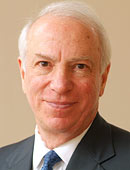Biographical Information

Born in 1945 at Richmond, Va., Bonnie received his bachelor of arts degree from the Johns Hopkins University in 1966 and his law degree from Virginia three years later. He ranked first in his law school class, served on the editorial board of the Virginia Law Review, and belonged to the Order of the Coif and the Raven Society. Following graduation, Bonnie taught at the Law School for a year before becoming associate director of the National Commission on Marihuana and Drug Abuse, serving from 1971 to 1973. In March 1972, the commission, under the direction of former Pennsylvania governor Raymond P. Shafer, unanimously recommended the decriminalization of consumption-related marijuana offenses. Although the report was endorsed by organizations such as the National Council of Churches and the National Education Association, it was quickly rejected by President Nixon and drew only a mixed response from state legislatures. An amendment to the Uniform Controlled Substances Act, drafted partially by Bonnie and incorporating the commission's findings, was approved by the National Conference of commissioners on Uniform
State Laws in 1973.
"From 1972 through 1977," Bonnie writes in the preface to his 1980 book, Marijuana Use and Criminal Sanctions, "I was actively involved in the effort to win legislative support for reforming the marijuana laws (p. iii)." During most of these years he was also teaching at the Law School (having returned in the fall of 1973), but he found time to participate in the marijuana reform movement in several ways. Bonnie was appointed to the National Advisory Council on Drug Abuse (1975-1980), served as a special assistant to the Attorney General of the United States, and helped write President Ford's White Paper on Drug Abuse in 1975. He testified on marijuana policy before two U.S. Senate subcommittees and 15 state legislative committees, and in 1976-1977 helped the National Governors' Conference develop its study on state marijuana penalties and policies. In 1977 he visited several European countries for the federal government, in part to explain the Carter administration's endorsement of marijuana decriminalization.
Besides Marijuana Use, Bonnie also co-authored The Marihuana Conviction (1974) with Virginia colleague Charles H. Whitebread II, as well as numerous articles on marijuana and drug law for scholarly journals and for periodicals ranging from the Washington Post to the National Enquirer. In the 1980s, Bonnie began to move away from drug law and turn his attention more to the fields of psychiatry, mental health and criminal law. He was chairman of the State Human Rights Committee (1979-1985), which was responsible for protecting the rights of the mentally ill and retarded in Virginia's public institutions, and co-authored a casebook on criminal law (1982) with Virginia professors Peter W. Low and John C. Jeffries, Jr. Bonnie became a noted expert on the insanity defense, a heated issue following the acquittal of John Hinckley, Jr. in 1982 for the attempted assassination of President Ronald Reagan.
